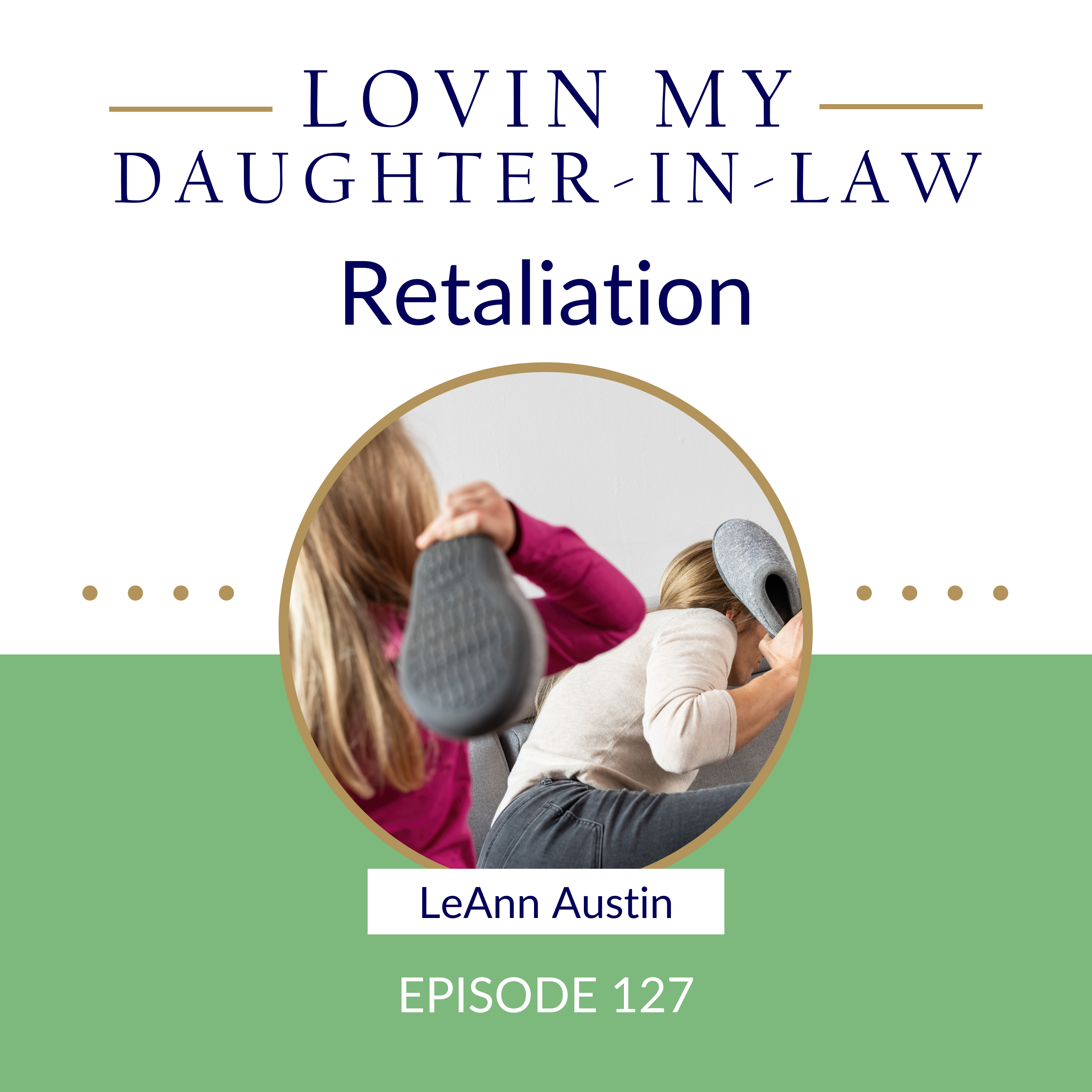Have you ever wanted to get back at another person? You’re thinking they hurt you, so you want to hurt them back.
This is called retaliation, and at times it totally makes sense that we’d feel this way.
Here are 4 alternative ways to approach a difficult situation.
Welcome to Lovin My Daughter-in-law Podcast. I’m relationship expert and master certified coach LeAnn Austin. I’ll help you create more connection and fun with others, especially your daughter-in-law.
Hey y’all, you’re listening to Lovin My Daughter-in-law, episode #127: Retaliation
I was talking to a mother-in-law and she shared that her daughter-in-law had, quote “taken away her son and ruined her life”. This mother-in-law was very upset and was thinking of what she could do to get back at daughter-in-law. The mother-in-law mentioned that she had stopped reaching out to her daughter-in-law. When they were together, she ignored her and the things she said were not very nice. Mother-in-law was thinking that her life was ruined because of daughter-in-law and believed that retaliation was the answer.
I’m guessing we’ve all done this with someone in our lives. We felt hurt and we think that responding to something hurtful with something equally or more hurtful will make us feel better. And maybe it will temporarily. However, long term, it’s probably not the direction we really want to go.
The definition of retaliation is responding to a negative action with another negative action, often with the intention of getting back at that other person. It’s a tit-for-tat reaction. Retaliation usually stems from a strong emotions like anger, frustration, or a desire for revenge. These emotions can cloud our judgment and lead to impulsive actions. Retaliation often also leads to a cycle of increased aggression, where the conflict becomes bigger and more damaging. It hurts relationships and creates a cycle of negative actions.
So, what are some alternative ways to approach these difficult situations? Well, here are four of my favorites.
First, communication. Instead of retaliating, it’s more constructive to communicate our feelings as calmly and clearly as possible. For example, the mother-in-law saying, I don’t get to see my son very often and it’s painful for me. As I’m getting used to him being with another woman, I may be snarky at times. I know my son loves you, and I love you, too. As I’m learning my new role as a mom and mother-in-law, I hope we can share what we’re feeling with each other often. Hmm, sounds a little different and maybe better than retaliating.
The second thing is to understand intent. Often, the initial action wasn’t meant to cause harm. Clarifying intentions can help reduce the impulse to retaliate. Daughter-in-law did not intend to “take away her mother-in-law’s son or ruin her life”. This is an opportunity to step back and recognize daughter-in-law and son are creating a life together. And that doesn’t mean mother-in-law can no longer be a part of the expanding family or that anyone’s life is ruined.
Number three, seek resolution. Focus on finding a solution rather than escalating the conflict with retaliation. This might involve giving the benefit of the doubt, taking a break to cool down, or asking for help.
And last, empathy and forgiveness. Trying to understand the other person’s perspective and choosing to forgive can break the cycle of retaliation. As I discussed with this mother-in-law some other options besides retaliation, she began to see that daughter-in-law wasn’t trying to ruin her life, she simply was loving her son. And actually as the mother-in-law thought about it some more, she was so grateful for that. Having empathy and choosing to forgive increases the love we feel for ourselves as well as everyone around us.
So the next time you want to get back at someone or hurt them, remember these four alternatives to retaliation: Communicate, understand their intent, seek resolution, and try empathy and forgiveness.
I love this quote from Martin Luther King, Jr, “Man must evolve for all human conflict a method which rejects revenge, aggression, and retaliation. The foundation of such a method is love.” Hmm, something to think about.
Have a good one y’all, and here’s to connection and love.
If this podcast resonates with you, share it with a friend and leave a review.
If you enjoyed this podcast, take a look at my Connection Crew program and One-on-One coaching options by checking out the show notes. In those programs, I teach and coach a variety of ways to have more fun and connection in your relationships. I also share how I have created a beautiful relationship with my daughters-in-law.
And if you want one easy question you can keep in your back pocket and use to increase the love you feel for your daughter-in-law today, go to leannaustin.com and get the one question.






